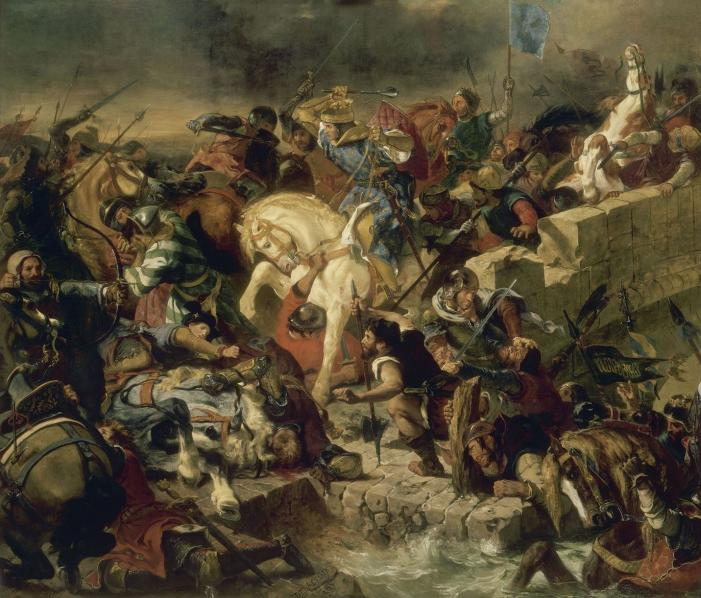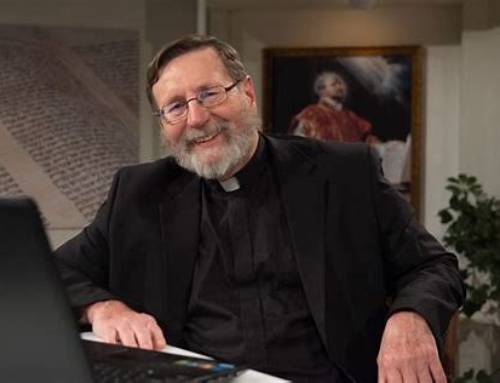During my recent bout with the flu I had the chance to re-read Evelyn Waugh’s Sword of Honor trilogy. One of the criticisms of the books is that they are uneven, dull at times, confusing and disjointed. On re-reading I realize much of that was intentional. Waugh was showing the reality of war.
I’ve also been reading more church history–both George Weigel’s’ recent book The Irony of Modern Catholic History and Tom Holland’s Dominion-How the Christian Revolution Changed the World. Both books on church history are a reminder of one of my main punching points–that crisis in the church is what church history is all about. From the beginning the church has been engaged in a knock down, knuckle to chin battle.
That’s the default setting. From the start and in every age we have been engaged in a battle with corruption, heresy and immorality from within and persecution and attack from without.
It is only when we have this realistic understanding about the church that we can be the best Catholics we hope to be.
From Weigel and Holland’s books I was reminded that through all of this God’s providence runs strong. He is not operating outside the battle, but from within. There is a strange power through which his Divine Will prevails even in the midst of seeming defeat. In fact, it is through the defeat that he most amazingly triumphs. This is the message of the cross: that it is out of the very worst thing that could happen–mankind killing God’s Son–that mankind’s own redemption is won.
Now here’s the thing I learned from Waugh’s books–that in the midst of the conflict war is messy. It’s not glorious. It’s confusing and boring, mundane and maddening. Orders are lost, soldiers go AWOL, plans collapse, reinforcements don’t show up, supplies are stolen or simply go missing. There are spies, double agents, traitors and deserters. There is absurdity, incompetence, waste, indifference and insanity. That’s what war is like.
If you think war is some sort of noble, battle with upstanding soldiers strutting on parade, a glorious triumph and a fluttering flag, then you’re delusional. That’s icing on the cake once it is all over. In fact, war is mud, guts, pain and mostly stupid, senseless violence in which millions of innocent people end up suffering and dying.
When we accept that being a Catholic means being involved in the great spiritual battle, then we might just start to be a good Catholics. Is the Catholic Church burdened with lousy liturgies, poor preaching, brutal buildings, mundane music and incompetent leadership? Is the church weighed down with scandal, idiocy, human failures and foolishness to a degree that is mind boggling? Does the church seem to lurch from one disaster to another in seeming confusion, indifference and dunderheadedness?
That’s war.
If we accept this, then we knuckle down, understand from whom we get our orders and we do what we can with what we have where we are.
But if we fail to accept this we too often choose other options–all of which are forms of desertion. We spend our time, effort and money doing just about anything other than engaging in this battle. We build religious comfort zones, using our religion to hunker down in little self made fortresses instead of going into battle. These little fortresses might be our preferred, elitist sect in which everything is focussed on our liturgical and spiritual correctness, or it might be our politically correct subset in which we exchange the real battle for some political ideology that we find more attractive. Our getaway might be a feel good Bible study group or websites where incendiary writers toss us red meat about how terrible all the bishops are and how corrupt and wicked the cardinals are. All of these, and many more, can become satisfying ways to duck down, blame others and avoid the reality of the battle.
How can I assess these faults? Because I’m tempted by them too, but there is one thing that keeps me focussed.
The parish. The Catholic parish is the place where the battle goes on, and most parishes are not perfect. They’re made up of real people who are struggling to make the faith real in their families, their schools, their workplaces and their marriages. There are few parishes where the worship is always perfect and Catholicism is exactly the way we’d like it. Parishes are often battlegrounds and like any battle, that can be messy and confusing, bewildering and hard work.
So join the battle. When you see something wrong, if it is in your power to fix it, do so. Otherwise, find out what your role is in the battle and do that one thing to the best of your ability and don’t worry.
Remember, all of us are looking at the big picture through a keyhole. The big picture is one of those dioramas of a great battle scene. It shows the whole field of battle with hand to hand combat, a glorious charge of cavalry, the general accepting his enemies surrender and the flags of victory flying, but the picture also shows individual agonies–a soldier dying in the field, a horse writhing and wild eyed in fear, a headless corpse and a trampled child. If you look at the picture through the keyhole you only see one detail of the brutal battle and you may be tempted to despair.
But the truth is the big picture—of a war already won and the mess we’re in at this time is simply the mopping up operations.






The only thing worse than war is living under tyranny. If the pacifist has his way, he learns to live as a slave to the State or he gets extra freedoms and privileges because he’s part of the repressive ruling authority. You’re right about the wars within and outside the church, but what really makes me angry about the sin of the Bishops and their followers is the way they attempt to make themselves look so holy and good while they look down on the military man as the picture of evil. Most of the people I knew in the Navy were rude crude and socially unacceptable but at least they were not pretenders. I believe my brothers and sisters in the military will be much more humble during their checkout interview than the proud religious elite or the “progressive government elite.